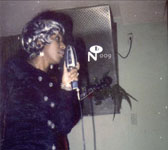|
|
 |
Dusted Reviews
Artist: V/A Album: Eccentric Soul: The Big Mack Label Label: The Numero Group Review date: Aug. 6, 2006 |

|
|
|
 |
An irony of eccentric music is that normal people make it – normal people are flawed. If we could peer above the zeitgeist, high school talent show acts and open mic nighters might interest us on an anthropological level, as can old recordings of under-the-radar soul musicians. In fact, this is increasingly possible because relentless fictions about perfect skin and pitch have inadvertently drawn listeners to the negative space in which dwells imperfection, the true soul of normalcy.
With The Big Mack Label, the truffle pigs at the Numero Group have reaped another crop of imperfect soul gems for their Eccentric Soul series, and they've presented them with the barely contained enthusiasm of successful dustbin sleuths. In their day, these songs must have sounded like off-kilter musicians with second-rate equipment working in the crowded shadow of Motown, which is precisely what they were. But today we hear them as damaged relics, some of which swing OK.
What exactly did Big Mack do wrong/right? First, label owner Ed McCoy (Big Mack himself!) had connections but no business experience or savvy. His first records, made by Edd Henry, the Manhattens, and L. Hollis and the Mackadoos, were not profitable – the Manhattens are bland, Henry bleats in near staccato, and Hollis' brass-crazy instrumentals, the best and strangest of the bunch, were never even released. In need of a new business plan, McCoy bought a building in Detroit to be used as a recording studio, though it was not built to be used that way, nor acoustically appropriate.
[Harry Dhesi from Glasgow's tour of soul landmarks on soulfuldetroit.com has a picture of the empty field where the building once stood – it's likely, given the surrounding architecture, that the interior was tall and uniform and possessed of bouncy walls.]
The happy accidents commenced once McCoy started offering studio time to singers and musicians for $14.95 a song, opening the floodgates to worthy artists short on cash. Bob & Fred were among those who responded to McCoy's advertisement, and their vocal-centric two-minute piece, "I'll Be On My Way," was soon being officially pressed by the label. Amazingly, it sounds more polished than anything Big Mack had previously managed when deliberately seeking new acts.
Through the decade, McCoy improved markedly as a producer, but remained an uninventive businessman content to adapt to the trends of the moment, which had both good and bad consequences. In the late '60s, for instance, he dabbled in west coast psychedelia with Soul President's "Got To Have It," which strings together, collage-like, just about every period reference imaginable – "The war in Vietnam," "Psychedelic guitar," "Strollin' down Haight Street," "We gonna do it hippie style" et al, along with some indexical riffing. The single failed. Concurrently, the label began to assemble a roster of female artists for the first time. Mae Young couldn't shout like Marva Whitney, but she had the basic idea, and her backing band complemented her well. Ms. Tyree "Sugar" Jones and Fever were over-the-top sultry. If Big Mack ever hit a stride, it was then.
But McCoy had a mysterious aversion to professional distribution, a damning phobia if ever there was one in the biz. As such it's difficult to know which of his releases were too rough and which too scarcely available to have become commercial successes. Though the question might be moot for people like the staff at Numero, who prefer their music unpolished, unknown, and, well, normal.
By Ben Tausig
|







